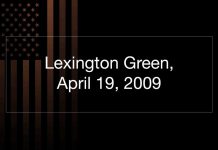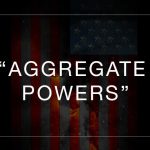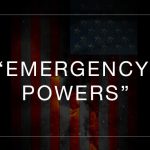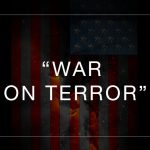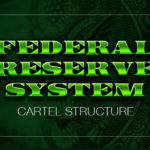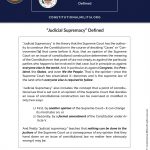Last Updated on October 5, 2021 by Constitutional Militia
[An address given to the 2007 Constitution Day Conference of the New Hampshire Center for Constitutional Studies, Nashua, New Hampshire, on 23 September 2007.]
Patrick Henry admonished his countrymen to “guard with jealous attention the public liberty.” Doubtlessly, every patriot in that era knew what he meant. Today, Americans have constantly thrust at them the term “homeland security”—with the tacit assumption in this barrage of propaganda that everyone knows what “homeland security” means. To be sure, no contemporary patriot could complain if attaining “homeland security” entails “guard[ing] with jealous attention the public liberty,” as Patrick Henry understood those words. But apparently the purveyors of the term “homeland security” expect Americans to deduce its meaning from our nation’s more recent experiences. Very well. When during the 20th century has America enjoyed a state of affairs that could rightfully be called “homeland security”?
Consider the numerous military conflicts in which America participated. All were fought ostensibly for reasons of “national security.” Some were supposedly won—and at a superficial level they may have been. Some were admittedly lost. Yet, at the most fundamental level, in the long term each and every one of them brought with it a major defeat for America’s true national security, with fateful consequences both at home and abroad.
This, because a war is not won or lost only on the battlefields, but also, perhaps especially, in the state of affairs that flow from it into the future. Ostensibly “winning” a war is never as important as preserving America’s political principles and institutions. “Winning” a war can never be an excuse to disregard, to subvert, and especially to destroy those principles and institutions. Indeed, “winning” a war depends upon preserving, protecting, and passing on to future generations those principles and institutions intact and vibrant.
Let us now peruse the historical record.
• In World War I, the rhetoric was stirring: It was “the war to end all wars” and “the war to make the world safe for democracy.” The reality, however, was that neither of these grandiose goals was achieved.
America’s involvement as a participant in the fighting, rather than as a neutral mediator, guaranteed the destruction of the old order, and the future instability, of Europe. Several monarchies were toppled—Germany, Russia, Austria, Hungary. But they were not replaced with stable “democracies.” Rather, the collapse of Russia unleashed Bolshevism. The economic, political, and social chaos that descended upon Germany led to Hitlerism. And the Treaty of Versailles generated revanchisme throughout Central Europe, thus sowing the dragon’s teeth for a future, even more destructive war.
The only apparent “success” was the establishment of the League of Nations. But this was a success only for the proponents of “world government.” As such, it was a direct attack on America’s national independence. For a dangerous fallacy and folly lurked at the heart of the slogan “the war to end all wars”: If there would be no more wars, it could only be because no nation could launch a war. Which would require international disarmament, permanently enforced. Which would require a world super-state with irresistible police powers.
Moreover, a dangerous fallacy and folly lurked at the heart of the slogan “the war to make the world safe for democracy.” If “democracy” were to be brought to the whole world—presumably, by some supra-national organization—that would include America, too. America, however, is not a “democracy,” but a constitutional federal republic. America cannot become a “democracy” without destroying what is uniquely American. So, either the American proponents of this slogan did not understand their own country’s special political nature and legal structure, or they intended to change them radically—indeed, to destroy them utterly.
• In Europe, World War II actually started when Hitler and Stalin signed their 1939 Pact that set the stage for their joint invasion, conquest, and partition of Poland. Yet America then found herself allied with Stalin, one of the original aggressors. And, in the end, Stalin not only won his war against Hitler, but also was allowed to keep everything for which he had bargained in 1939, and to absorb a great deal more besides in Eastern Europe.
In Asia, the war started over the Japanese incursion into China—“maintaining the territorial integrity of China” was America’s professed goal in that area. In addition to this, the on-going Chinese civil war posed the second great threat of communism. At Yalta, however, Roosevelt invited Stalin into the Asiatic war. With Stalin’s assistance, Mao Tse-tung’s communists took over mainland China, driving the Nationalists to Taiwan—thus obliterating “the territorial integrity of China”. And another nation of the war’s “Big Four” became a totalitarian communist state.
The sole unalloyed “success” of World War II—but, once again, only for the globalists—was the formation of another, even-more-extensive apparatus for “world government”, the United Nations. Yet “united” in what, when one of the two original aggressors in World War II sat in the Security Council? And what “nations” did the Dark Powers behind this apparatus expect would survive its intended evolution? Was it not designed eventually to subordinate all nations to its control, and then to supplant them with some supra-national apparatus?
• The Korean “police action” and the Vietnamese conflict were direct consequences of the loss of World War II in China. The results speak for themselves.
• Now, America is embroiled in a conflict in the Middle East—which its proponents promise will be an endless “war of civilizations”, with this country pitted against 1.5 billion Muslims until either Islam, or America, is destroyed.
America’s “homeland security” has steadily decreased as a result of these conflicts.
• In support of interventionism , Woodrow Wilson sold Americans the bill of goods that the quarrels of the world were their quarrels, in which they must become involved at whatever cost in blood and treasure. This was aimed at promoting globalism—at that time through America’s involvement in the League of Nations. That trick did not work. But the Sirens’ song of interventionism and internationalism has remained the constant theme of every Administration since then.
Importantly, as well, Wilson oversaw the creation of both: (i) the individual income tax, which laid the subflooring in the comprehensive national-surveillance state the Dark Powers were planning; and (ii) the Federal Reserve System, which erected the superstructure of monetary and banking fascism over America, without which her involvement in World War I—and in later conflicts as well—probably could never have been financed.
• Franklin Delano Roosevelt promoted more globalism, through the United Nations. Although the Federal Reserve System had failed in 1932, he gave it more power, and used the collapse of the banks as an excuse to exert even more financial control than ever over individuals, through the gold seizure and the prohibition of “gold-clause contracts”. And he ushered in the national dependency-state with Social Security. Overall, Roosevelt promised Americans “freedom from want” and “freedom from fear”—and now they suffer from more fear than ever, and soon will know increasing want.
• Lyndon Johnson, sold Americans the snake oil that they could have both bread and bullets: both the massive governmental spending of Johnson’s Great Society and the extensive and expensive slaughter of the Vietnamese conflict. This childish swindle was floated on the confidence game of fiat-currency inflationism as the way out of all difficulties: spend and spend, inflate and inflate, elect and elect.
• Now, under George W. Bush, America has retrogressed from a “limited war” in part of Southeast Asia, that proved to be unwinnable as it was fought, to an unlimited, never-ending conflict with 1.5 billion Muslims throughout the entire world, which is unwinnable no matter how it is fought.
Meanwhile, here at home, America’s most dangerous enemies—and America’s most dangerous enemies are always domestic enemies—are working tirelessly behind the scenes to submerge her in the North American Union. This globalist scheme is even worse than the League of Nations or the United Nations. For both of them at least pretended to accept the continued existence of the various nations that composed them; whereas, the North American Union is openly designed to end America’s national independence—and her unique form of constitutionalism—entirely.
And to ensure that Americans can do nothing about their country’s imminent demise, the globalists are asserting more and more claims of “war powers,” “emergency powers,” “inherent powers” of the “Commander in Chief,” and powers of “martial law”—all of which are to be exercised through abolition of the posse comitatus doctrine, establishment of military commissions, the para-militarization of State and Local police, domestic espionage by an unlimited surveillance state, and repression of dissenters, under color of fighting “the global war on terror.”
This rather lugubrious history can be summed up in the term “black-hole politics”: All unchecked political power gravitates towards a central high point and intensifies, while all undefended individual liberty gravitates towards a low point from which none escapes. The sequence in this country involves:
- concentration of power in the General Government at the expense of the States and WE THE People; then
- centralization of power in the Executive Branch; then • localization of power in the President (the so-called “Decider”); and finally
- para-militarization of the whole apparatus, from top to bottom, with black-uniformed thugs loyal to the Leader; while
- the Constitution is systematically degraded to a largely ceremonial document that controls the procedures for elections of certain public officials, but then imposes next to no limits on their behavior.
Although none of this has provided security for the American people, but instead has led to ever-increasing insecurity, it has gone on, and promises to go on into the indefinite future. Why? Well, notice how natural it is to speak of all these events in terms of specific Leaders, such as Wilson, Roosevelt, and Bush. So natural that it compels the conclusion that this litany of woe has resulted from the American people’s having acquiesced, and continuing to acquiesce, in misrule by the Leader Principle—or, in the language most appropriate for expressing it, das Führerprinzip.
To provide true “homeland security,” Americans need to put into place—and, even more importantly, to put into operation—institutions that minimize the opportunities for the Leader Principle to come into play, if not preclude and exclude it altogether.
Americans already know how to do that. American constitutionalism is the very opposite of the Leader Principle, and therefore the true source of “homeland security.”
Under the Leader Principle, anything can happen, depending on the intelligence, talents, psychology, character, and even the appetites and vices of the Leader. This situation is the essence of political and economic insecurity. In contrast, under the Constitution, Americans know what must happen— or at least what is always supposed to happen. The situation is not one of changing and unpredictably changeable “leaders”, but of laws. This is the essence of political and economic security.
So, the Constitution being the key to the matter, exactly what does it say about security? The only place in the Constitution where the word “security” appears is the Second Amendment: “A well regulated Militia, being necessary to the security of a free State, the right of the people to keep and bear Arms, shall not be infringed.” Notice, though: not just “security,” but “the security of a free State.” This and this alone is the proper definition of “homeland security”: the security of America as “a free State.” Moreover, “[a] well regulated Militia” is “necessary” for such security. And all of these—“a free State,” its “security,” and “[a] well regulated Militia”—are linked, in a cause and effect relationship, to “the people,” not to some “leader.”
In particular, all of them are linked specifically to “the people’s”—not some “leader’s”—exercise of the Power of the Sword: “the right * * * to keep and bear Arms.” “[T]he right of the people to keep and bear Arms” as against whom? As against public officials. “[T]he right of the people to keep and bear Arms” represents the ability of the principals to exercise power—if necessary, firepower—against their own rogue agents. The Second Amendment directs that public officials shall be absolutely subject to “the people” in the most important particular possible: control over the instruments of political force. Thus, the Second Amendment rather starkly excludes the Leader Principle, and takes as its foundation the People Principle.
Under the original Constitution, although the word “security” is not used, the essential elements of “homeland security” are laid out in the Preamble:
• “[A] more perfect Union”—not the creation of artificial divisions and synthetic strife within society, as through the balkanization of this country by means of “multiculturalism” and “pluralism.”
• “Justice”—the result of applying those “just powers” that the Declaration of Independence tells us governments “deriv[e] * * * from the consent of the governed,” and that stem originally from the moral and theological precepts of “the Laws of Nature and of Nature’s God.”
• “[D]omestic Tranquility”—not just the absence of turmoil, but, as the Declaration of Independence recites, a state of affairs that allows for every man to engage in “the pursuit of happiness”; that is, a social and political context in which all men of good will can live peaceful, prosperous lives.
• “[T]he common defence”—not aggression and neo- imperialism, but “America first, second, and third.” ·“[T]he general Welfare”—not the prostitution of government to pander to selfish special interests, but the exclusion of factions from the public councils.
• “[T]he general Welfare”—not the prostitution of government to pander to selfish special interests, but the exclusion of factions from the public councils.
• “[T]he blessings of Liberty”—not a police state, a surveillance state, or a national-security state, but “a free State” in which WE THE PEOPLE themselves hold in their own hands the ultimate power.
What are the structures the Constitution provides to attain this vision of “homeland security”? They are the seven pillars of American political wisdom:
• Pillar 1— WE THE PEOPLE as the sovereigns, who alone enjoy the authority to set up or to change the government. This appears explicitly in the Constitution: “WE THE PEOPLE * * * do ordain and establish this Constitution for the United States of America.” This, in turn, results from the broader principle stated in the Declaration of Independence: “That whenever any Form of Government becomes destructive of these ends, it is the Right of the People to alter or abolish it, and to institute new Government, laying its foundation on such principles and organizing its powers in such form, as to them shall seem most likely to effect their Safety and Happiness.”
• Pillar 2 — WE THE PEOPLE as the electors, who choose individuals to administer the government from day to day.
• Pillars 3, 4, and 5 — These are WE THE PEOPLE’S agents for national concerns: Congress, the President, the Supreme Court.
• Pillar 6 These are WE THE PEOPLE’S agents for local concerns: the States. Last but not least,
• Pillar 7 — WE THE PEOPLE organized in, and able to act at all times through, “the Militia of the several States.”
Nowhere in this structure does the Leader Principle appear. Nowhere. Every pillar of the Constitution— and of the Declaration of Independence from which the Constitution draws its authority—is based upon the People Principle, the principle of self-government by WE THE PEOPLE. In this structure, public officials are only and always agents, never principals — strictly speaking, they are only and always followers of the instructions of others, never true “leaders.” For part two click below.































